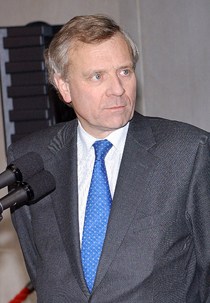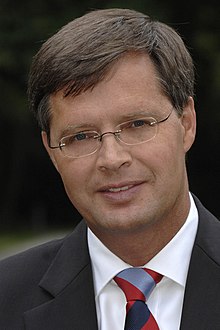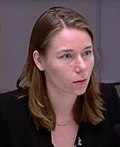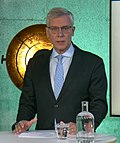Christian Democratic Appeal
Christian Democratic Appeal Christen-Democratisch Appèl | |
|---|---|
Elections |
The Christian Democratic Appeal (CDA, Dutch: Christen-Democratisch Appèl, pronounced [krɪstə(n)deːmoːkraːtis ɑˈpɛl]) is a Christian-democratic[3][4][5][6] and socially conservative[7][8] political party in the Netherlands. It was originally formed in 1977 from a confederation of the Catholic People's Party, the Anti-Revolutionary Party and the Christian Historical Union; it has participated in all but three of the Dutch cabinets formed since it became a unitary party.
Health Minister Hugo de Jonge served as Leader of the Christian Democratic Appeal from July 2020 until his resignation the following December. Finance Minister Wopke Hoekstra was then chosen as lead candidate for the 2021 general election, becoming the de facto party leader.[9] After the 2017 general election, in which the party won 19 seats (third place), the CDA became a junior coalition partner in the Third Rutte cabinet with the People's Party for Freedom and Democracy, Democrats 66 and Christian Union. The Fourth Rutte cabinet was formed upon the same coalition.
History
Predecessor parties; history before 1977
Since 1880, the sizeable Catholic and Protestant parties had worked together in the so-called


By 1918, there were three major Christian Democratic parties in the Netherlands—the
From 1918 to 1967, the three Christian Democratic parties had a majority in both houses of the States General, and at least two of them were included in every cabinet. The KVP and its antecedents had been in government without interruption since 1918.
In the 1960s, Dutch society became more secularised and the pillars faded, and voters began to move away from the three Christian-democratic parties. In the 1963 general election the three parties held 51% of the vote, whilst in 1972 general election they held only 32%. This decline forced the three parties to work closer together. In 1967 the Group of Eighteen was formed: it was a think-tank of six prominent politicians per party that planned the future cooperation of the three parties. In 1968 the three political leaders of the parties (Norbert Schmelzer (KVP), Barend Biesheuvel (ARP) and Jur Mellema (CHU) made a public appearance, stating that the three parties would continue to work together.
This caused progressive forces within the three parties, especially the ARP and KVP, to regret their political affiliation. In 1968 they founded the Political Party of Radicals (PPR), a left-wing party that sought cooperation with the Labour Party (PvdA). Locally and provincially however the three parties had long cooperated well, in some areas they formed one Christian-democratic parliamentary party and proposed one list of candidates. In the 1971 general election, the three parties presented a common political program, which lay the foundation for the first Biesheuvel cabinet.


After the disastrous elections of 1972, the cooperation was given new momentum. Piet Steenkamp, a member of the Senate for the KVP was appointed chairman of a council which was to lay the foundation for a federation of the three parties, and provide a common manifesto of principles. In 1973 this federation was officially formed, with Steenkamp as chairperson.
The cooperation was frustrated by the formation of the
Period of premierships, 1977–1994
In 1976, the three parties announced that they would field a single list at the
The election result forced Van Agt to start talks with Den Uyl. Although Van Agt had been Deputy Prime Minister in the cabinet Den Uyl, the two had never gotten along well. The animosity between them frustrated the talks. After more than 300 days of negotiations, they finally officially failed, and Van Agt was able to negotiate a cabinet with the conservative-liberal People's Party for Freedom and Democracy (VVD). The first Van Agt cabinet had a very narrow majority. The unexpected cabinet with the VVD led to split within the newly founded CDA between more progressive and more conservative members. The progressives remained within the party, and were known as loyalists. On 11 October 1980, the three original parties ceased to exist and the CDA was founded as a unitary party. After the 1981 general election, the VVD and the CDA lost their majority, and the CDA was forced to cooperate with the PvdA. Den Uyl became deputy prime minister under van Agt. The second Van Agt cabinet was troubled by ideological and personal conflicts, and fell after one year.
After the
Opposition to Labour and liberal parties, 1994–2002
The 1994 general election was fraught with problems for the CDA: personal conflicts between retiring prime minister Lubbers and lead candidate Elco Brinkman, a lack of support for the reforms of old age and disability pensions, and the perceived arrogance of the CDA caused a dramatic defeat at the polls. A new coalition was formed between PvdA and the liberal parties VVD and Democrats 66 (D66), consigning the CDA to opposition for the first time ever. It was also the first government without any Christian Democratic ministers since 1918. The party was marred by subsequent internal battles over leadership. The party also reflected on its principals: the party began to orient itself more toward communitarian ideals.
Balkenende cabinets, 2002–2010
During the tumultuous



After the
Partner in Rutte cabinets, 2010–present
In the 2010 general election the CDA lost half of its seats and came in fourth place after VVD, PvdA and the Party for Freedom (PVV). Balkenende announced his resignation and stayed prime minister until the formation and inauguration of the Rutte cabinet.
After the fall of the short-lived first Rutte cabinet in 2012, in which the CDA participated as junior coalition partners to the VVD, the party announced a leadership election. On 18 May 2012 the party announced that the leadership elections were won by Sybrand van Haersma Buma. He received more than 50 percent of the votes. The popular Mona Keijzer, the rising star within the party, received 26% of the votes and announced that she would closely collaborate with Van Haersma Buma during the election campaign prior to the Dutch general election on 12 September 2012. In that election, the CDA suffered considerable losses, falling to 13 seats. The party was excluded from the second Rutte cabinet—only the second time in its history that the party has not been in government. At the municipal elections of 19 March 2014 the CDA won 18% of all the votes and remained the largest party in Dutch municipalities.[11]
In the 2017 general election, the CDA gained six seats to become the third largest party.[12] It continued to remain in government as part of the third Rutte cabinet, with the VVD, D66 and CU.
On 19 March 2021, chairman Rutger Ploum resigned after the party looked to have lost 4 out 19 seats in the 2021 general election.[13] In August 2023 Henri Bontenbal succeeded Wopke Hoekstra as leader of the party. He led the party throught the 2023 Dutch general election, where the CDA got 5 seats and 3.3% of the popular vote, making it the worst result in the party's history.[14]
Ideology
The CDA is a
The party has four main ideals:
Practically, this means the CDA is a
In the past, Maxime Verhagen, then informal leader of the CDA and deputy Prime Minister, strongly denied the claim that the CDA is a right-wing party. Verhagen made it clear to the media that his party is a centrist and moderate party, and that the CDA participates in a centre-right coalition (with the People's Party for Freedom and Democracy (VVD) as the right-wing component and the CDA as the centrist component).[24] Instead, his former colleague in the cabinet, minister of Defence Hans Hillen, was a strong proponent of a conservative CDA.
- The state deficit should be repaid in one generation to cope with the effects of the aging population.
- The toleration of soft drugs should come to an end and the practices of prostitution, abortion and euthanasia should be more limited.
- The party is a staunch proponent of European integration and Turkey's possible EU membership in the future.
- The party wants to make schools and hospitals more responsible for their own policy instead of being regulated by the government.
New party course
At a congress on 21 January 2012 the party adopted a centrist course, dubbed by former minister of Social Affairs
- limiting the home mortgage interest deduction;
- introduction of flat tax;
- ecotax);
- a pro-European policy;
- a more friendly immigration policy;
- equal chances for every person;
- more investment in higher education;
- and a modern social policy.
In 2014, the party leader Van Haersma Buma announced that CDA was now officially in favour of directly elected mayors,[26] although a large majority of its members are opposed to elected mayors.[27]
Electoral results
House of Representatives
| Election | Lead candidate | Votes | % | Seats | +/– | Government |
|---|---|---|---|---|---|---|
| 1977 | Dries van Agt | 2,653,416 | 31.9 (#2) | 49 / 150
|
Coalition | |
| 1981 | 2,677,259 | 30.8 (#1) | 48 / 150
|
Coalition | ||
| 1982 | 2,420,441 | 29.4 (#2) | 45 / 150
|
Coalition | ||
| 1986 | Ruud Lubbers | 3,172,918 | 34.6 (#1) | 54 / 150
|
Coalition | |
| 1989 | 3,140,502 | 35.3 (#1) | 54 / 150
|
Coalition | ||
| 1994 | Elco Brinkman | 1,996,418 | 22.2 (#2) | 34 / 150
|
Opposition | |
| 1998 | Jaap de Hoop Scheffer | 1,581,053 | 18.4 (#3) | 29 / 150
|
Opposition | |
| 2002 | Jan Peter Balkenende | 2,653,723 | 27.9 (#1) | 43 / 150
|
Coalition | |
| 2003 | 2,763,480 | 28.6 (#1) | 44 / 150
|
Coalition | ||
| 2006 | 2,608,573 | 26.5 (#1) | 41 / 150
|
Coalition | ||
| 2010 | 1,281,886 | 13.6 (#4) | 21 / 150
|
Coalition | ||
| 2012 | Sybrand Buma | 801,620 | 8.5 (#5) | 13 / 150
|
Opposition | |
| 2017 | 1,301,796 | 12.4 (#3) | 19 / 150
|
Coalition | ||
| 2021 | Wopke Hoekstra | 989,385 | 9.5 (#4) | 15 / 150
|
Coalition | |
| 2023 | Henri Bontenbal | 345,822 | 3.3 (#7) | 5 / 150
|
TBA |
Senate
| Election | Votes | Weight | % | Seats | +/– |
|---|---|---|---|---|---|
| 1977* | 24 / 75
|
||||
| 1980 | 27 / 75
|
||||
| 1981 | 28 / 75
|
||||
| 1983 | 26 / 75
|
||||
| 1986 | 26 / 75
|
||||
| 1987 | 26 / 75
|
||||
| 1991 | 27 / 75
|
||||
| 1995 | 19 / 75
|
||||
| 1999 | 20 / 75
|
||||
| 2003 | 46,848 | 29.0 (#1) | 23 / 75
|
||
| 2007 | 43,501 | 26.7 (#1) | 21 / 75
|
||
| 2011 | 86 | 24,260 | 14.6 (#3) | 11 / 75
|
|
| 2015 | 89 | 25,145 | 14.9 (#2) | 12 / 75
|
|
| 2019 | 76 | 19,756 | 11.4 (#3) | 9 / 75
|
|
| 2023 | 47 | 13,136 | 7.34 (#5) | 6 / 75
|
- 11 seats as a stand-alone party.
European Parliament
| Election | List | Votes | % | Seats | +/– | Notes |
|---|---|---|---|---|---|---|
| 1979 | List | 2,017,743 | 35.60 (#1) | 10 / 25
|
New | [28] |
| 1984 | List | 1,590,218 | 30.02 (#2) | 8 / 25
|
[29] | |
| 1989 | List | 1,813,035 | 34.60 (#1) | 10 / 25
|
[30] | |
| 1994 | List | 1,271,840 | 30.77 (#1) | 10 / 31
|
[31] | |
| 1999 | List | 951,898 | 26.94 (#1) | 9 / 31
|
[32] | |
| 2004 | List | 1,164,431 | 24.43 (#1) | 7 / 27
|
[33] | |
| 2009 | List | 913,233 | 20.05 (#1) | 5 / 25
|
||
5 / 26
|
[34] | |||||
| 2014 | List | 721,766 | 15.18 (#2) | 5 / 26
|
[35] | |
| 2019 | List | 669,555 | 12.18 (#3) | 4 / 26
|
||
5 / 29
|
[36] |
Representation
Members of the Fourth Rutte cabinet
| Ministers | Title/Ministry/Portfolio(s) | Assumed office | |||
|---|---|---|---|---|---|

|
Karien van Gennip (born 1968) |
Second Deputy Prime Minister |
Social Affairs and Employment |
5 September 2023 | |
Minister
|
10 January 2022 | ||||

|
Hanke Bruins Slot (born 1977) |
Minister
|
Foreign Affairs | 5 September 2023 | |

|
Hugo de Jonge (born 1977) |
Minister
|
Interior and Kingdom Relations |
5 September 2023 | |
State Secretaries
|
Title/Ministry/Portfolio(s) | Assumed office | |||

|
Marnix van Rij (born 1960) |
State Secretary
|
Finance | • | 10 January 2022 |

|
Vivianne Heijnen (born 1982) |
State Secretary
|
Infrastructure and Water Management |
• | 10 January 2022 |
Members of the House of Representatives
Members of the Senate
Members of the European Parliament
The CDA has been a member of the
Current members
Current members of the European Parliament since the 2019 election:
4 seats:
Local and provincial government
By far, the CDA has the most members of municipal and provincial councils in the Netherlands. Furthermore, it cooperates in most municipal and provincial governments.
Electorate
The CDA is mainly supported by religious voters, both Catholics and Protestants. These tend to live in rural areas and tend to be
Geographically, the CDA is particularly strong in the provinces of
Organisation
Leadership
|
|
|
|
Linked organisations
The youth movement of the CDA is the Christian Democratic Youth Appeal (CDJA). The CDA publishes a monthly magazine, and its scientific bureau publishes the Christian Democratic Explorations (Christen-Democratische Verkenningen).
As an effect of
The CDA participates in the Netherlands Institute for Multiparty Democracy, a democracy assistance organisation of seven Dutch political parties.
International organisations
The CDA is a member of the European People's Party[43] and the Centrist Democrat International.[44]
Further reading
- Bosmans, Jac (2004). Michael Gehler; Wolfram Kaiser (eds.). The Primacy of Domestic Politics: Christian Democracy in the Netherlands. Routledge. pp. 47–58. )
- Lucardie, Paul (2004). Steven Van Hecke; Emmanuel Gerard (eds.). Paradise Lost, Paradise Regained? Christian Democracy in the Netherlands. Leuven University Press. pp. 159–177. )
References
- ^ "Ledentallen Nederlandse politieke partijen per 1 januari 2024" [Membership of Dutch political parties as of 1 January 2024]. University of Groningen (in Dutch). Documentation Centre Dutch Political Parties. 28 February 2024. Retrieved 28 February 2024.
- ^ "Politieke fracties". Benelux Parliament (in Dutch). Retrieved 8 August 2023.
- ISBN 978-1-317-96827-6.
- ISBN 978-0-85724-091-0. Retrieved 20 August 2012.
- ISBN 978-1-56324-448-3. Retrieved 21 August 2012.
- ^ Nordsieck, Wolfram (2021). "Netherlands". Parties and Elections in Europe. Retrieved 21 March 2021.
- ISBN 978-1-85567-382-3.
- ISBN 978-90-5867-377-0.
- ^ "Wopke Hoekstra wordt lijsttrekker van het CDA" (in Dutch). Nederlandse Omroep Stichting. 11 December 2020. Retrieved 11 December 2020.
- ^ "Google Groups".
- ^ "CDA grootste na 80 procent stemmen geteld". 20 March 2014.
- ^ Kiesraad (21 March 2017). "Kerngegevens Tweede Kamerverkiezing 2017 - Rapport - Kiesraad.nl". kiesraad.nl.
- ^ "CDA-partijvoorzitter Ploum stapt op na verkiezingsnederlaag". NOS.nl (in Dutch). 19 March 2021. Retrieved 19 March 2021.
- ^ "NOS - Uitslagen Tweede Kamerverkiezingen 2023". app.nos.nl (in Dutch). Retrieved 11 March 2024.
- ^ "Kieskompas". Kieskompas. Archived from the original on 1 April 2021. Retrieved 1 April 2021."Netherlands". Freedom in the World 2003. Freedom House. Archived from the original on 29 June 2019. Retrieved 29 June 2019.
- ^ Bremmer, Ian (13 September 2012). "Going Dutch: The Netherlands' election results roll in". Foreign Policy. Retrieved 29 June 2019.
- ^ Delcker, Janosch (18 February 2018). "Risk of bioweapon attack growing, Dutch defense minister says". POLITICO. Munich. Retrieved 5 May 2020.
Bijlevel, a member of the centrist Christian Democratic Appeal party, said that the technology for creating biological weapons had advanced dramatically in recent years, while at the same time "the international community continues to underestimate this risk".
- ^ Weaver, Matthew (16 March 2017). "Dutch elections: Rutte starts coalition talks after beating Wilders into second – as it happened". The Guardian. Retrieved 30 March 2019.
- ISBN 978-92-871-6478-0.
- ISBN 978-1-317-50363-7.
- ISBN 978-1-317-96827-6.
- ^ "Uitgangspunten". CDA (in Dutch). Retrieved 7 March 2018.
- ^ Tom-Jan Meeus (January 29, 2021), The man defying Mark Rutte Politico Europe.
- ^ "Weblog Tom Louwerse: CDA middenpartij? Niet volgens eigen kiezers". Archived from the original on 28 December 2010. Retrieved 31 July 2011.
- ^ "CDA moet kiezer weer raken met keuze voor radicale midden". 21 January 2012.
- ^ "CDA voor gekozen burgemeester". February 2014.
- ^ "Veel steun gekozen burgemeester". 14 March 2014.
- ^ "Kiesraad: Europees Parlement 7 juni 1979" (in Dutch). Kiesraad. Retrieved 19 June 2019.
- ^ "Kiesraad: Europees Parlement 14 juni 1984" (in Dutch). Kiesraad. Retrieved 19 June 2019.
- ^ "Kiesraad: Europees Parlement 15 juni 1989" (in Dutch). Kiesraad. Retrieved 19 June 2019.
- ^ "Kiesraad: Europees Parlement 9 juni 1994" (in Dutch). Kiesraad. Retrieved 19 June 2019.
- ^ "Kiesraad: Europees Parlement 10 juni 1999" (in Dutch). Kiesraad. Retrieved 19 June 2019.
- ^ "Kiesraad: Europees Parlement 10 juni 2004" (in Dutch). Kiesraad. Retrieved 19 June 2019.
- ^ "Kiesraad: Europees Parlement 4 juni 2009" (in Dutch). Kiesraad. Retrieved 19 June 2019.
- ^ "Kiesraad: Europees Parlement 22 mei 2014" (in Dutch). Kiesraad. Retrieved 19 June 2019.
- ^ "Kiesraad: Europees Parlement 23 mei 2019" (in Dutch). Kiesraad. 4 June 2019. Retrieved 19 June 2019.
- ISBN 978-3-642-19413-9.
- ^ "Christen-Democratisch Appèl (CDA)". Parlement & Politiek (in Dutch). Retrieved 7 March 2018.
- ^ "Partijvoorzitters CDA". Parlement & Politiek (in Dutch). Retrieved 7 March 2018.
- ^ Brandemann, Ilse (23 March 2024). "Op het congres sneert Bontenbal naar de PVV. 'Niet Nederlanders, maar egoïsme op plek één'" [Bontenbal taunts the PVV at congress. 'Not Dutch citizens but egotism on top']. Nederlands Dagblad (in Dutch). Retrieved 26 March 2024.
- ^ "Eerste Kamerfractie Christen-Democratisch Appèl (CDA)". Parlement & Politiek (in Dutch). Retrieved 7 March 2018.
- ^ "Tweede Kamerfractie Christen Democratisch Appel (CDA)". Parlement & Politiek (in Dutch). Retrieved 7 March 2018.
- ^ "European People's Party". Archived from the original on 13 February 2013.
- ^ "Parties". Archived from the original on 27 March 2012. Retrieved 6 June 2012.
External links
 Media related to Christen Democratisch Appèl at Wikimedia Commons
Media related to Christen Democratisch Appèl at Wikimedia Commons- Official website
- Documentation Centre Dutch Political Parties about CDA (in Dutch)
